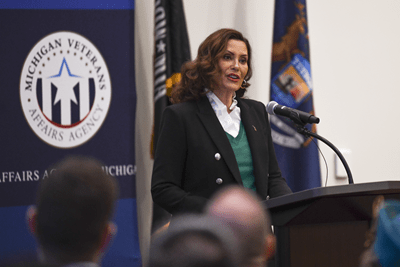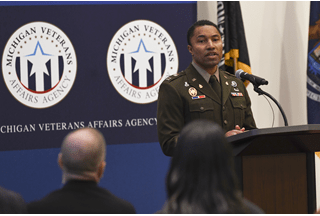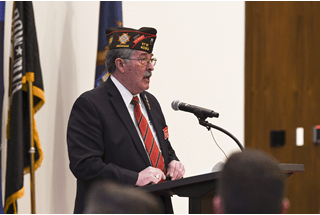The web Browser you are currently using is unsupported, and some features of this site may not work as intended. Please update to a modern browser such as Chrome, Firefox or Edge to experience all features Michigan.gov has to offer.
As MVAA enters its second decade, momentum builds for serving veterans
March 21, 2023

The Michigan Veterans Affairs Agency (MVAA) enters its second decade committed to building stronger partnerships with other veteran organizations, to better serving not only Michigan’s veterans but also their family members, and to attacking the issues that lead to veteran suicide.
As Gov. Gretchen Whitmer and other state and veterans’ officials spoke March 20 at the MVAA’s 10th anniversary recognition event, it was clear the MVAA has made significant strides in connecting Michigan veterans to their earned benefits.
But the state agency and its many partners also have much work to do to address the many problems facing today’s veterans. With more than 550,000 veterans calling Michigan home, the state has the 11th largest veteran population in the nation.
“As we recognize 10 years of service, let’s build on that momentum as we think about the next 10,” Whitmer told the crowd of more than 100 people gathered at the state Capitol’s Heritage Hall. “There’s still plenty to do. There’s no question. In collaboration with Veteran Service Organizations and county veteran service offices, the MVAA will continue leading efforts to connect veterans and their families to health care, paths to higher education and skills training and good paying jobs. Together, let’s ensure that veterans and their families are supported here in Michigan.”
The Whitmer administration’s latest budget proposal would provide $750,000 to hire more Veteran Service Officers in Michigan to support underserved areas and provide claims support for the PACT Act. The recently passed federal act expands VA health care to veterans exposed to burn pits, Agent Orange and other toxic substances. An estimated 175,000 veterans in Michigan could be eligible for PACT Act benefits.
Veterans and dependents can learn more about the PACT Act at the VA website.
Serving ALL veterans
MVAA Adam Hollier said Michigan is committed serving veterans of all eras and backgrounds, including underserved veteran populations such as women veterans, LGBTQ+ veterans and minority veterans.
Hollier said his grandfather joined the Army during World War II and was accepted into the pilot’s training program. When people learn of that fact, they ask if his grandfather was a Tuskegee Airman.
“No — my grandfather was fair enough that people thought he was white,” Hollier explained. “And so when he got accepted, they did so thinking that he was a white man and when they realized he was a black man, they summarily dismissed him.”
“Serving in this nation has not always been easy,” he noted. “It has been often done by people who our nation has not properly cared about, whether that was about your race, your gender, your sexual orientation. But as an agency and as a state, we are wholly committed to making sure that every single veteran gets the benefits they earned for serving their country.”
Working together to serve veterans
John Griffith is the current chairman of the Michigan Commanders Group, which represents the congressionally chartered Veteran Service Organizations in Michigan. He also serves as commander of one of those organizations, the VFW Department of Michigan.
Griffith, a Vietnam veteran, said the Commanders Group played a key role in getting the MVAA established 10 years ago. He thanked the MVAA and the Whitmer administration for their dedication to Michigan’s veteran families and said he’s proud to work alongside the MVAA in supporting veterans.
Griffith said the Veteran Service Officers who work for the Veteran Service Organizations and counties around the state secured more than $660 million in disability benefits for Michigan veterans in the past year alone. He also noted that the congressionally chartered Veteran Service Organizations have a combined 420 physical posts around the state — giving them a bigger footprint than both Starbucks and Dollar General in Michigan.
“As the partnership between the state and our veteran organizations continues to grow, I ask that we properly leverage our posts — to ensure the success of our veterans,” he said.
Griffith said one of his group’s biggest priorities is addressing the opioid epidemic in Michigan -- and specifically how many veterans are being overprescribed these narcotics and not being told about their side effects.
“The challenges facing Michigan veterans are great. The struggles are real. At times, the pain experienced by many of our comrades can be difficult to articulate,” Griffith said. “But the promise, the skills and the leadership abilities of Michigan veterans give us great confidence in a great and hopeful future for our veterans and their families.”

